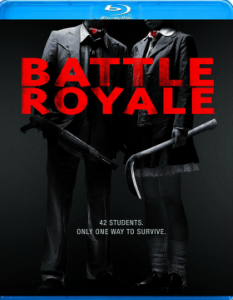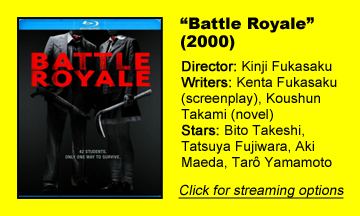“Battle Royale” is the 2000 Japanese film that predated “The Hunger Games’ ” saga of kids fighting each other to the death per government mandate, but it’s a lot more than that. It might be the ultimate BYOM movie, as in “bring your own metaphors.”
At times it plays like screenwriter Kenta Fukasaku (son of director Kinji) – adapting the 1999 novel by Koushun Takami – is a teenager putting his disillusionments into an absurdly violent action movie.
Residual teen angst
Both writers were in their 20s when they penned “Battle Royale” in their respective media, so there might be residual teen angst at play. And indeed, the film features several weird flashbacks to happier times. I think it might be saying that things that only seem like life or death – like a prep basketball game where you missed the shot at the buzzer – aren’t revealed for their trivial nature until you enter the adult world.
At other times, the film plays like a world-weary pitch-black comedy, like it’s from the perspective of a teacher who has given up on students ever behaving themselves. While explaining the rules of the Battle Royale on the remote island, teacher Kitano (Takeshi Kitano) tells his class they brought this upon themselves.
The only major adult character, Kitano never quite clicks as an ironic antihero of the piece, but “Battle Royale” takes initial steps in that direction. When we meet him, he’s knifed in the leg by a student in a random act of violence.
Later, Kitano notes that if he touches a student, he’ll get fired. When overseeing the Battle Royale, he finally can strike blows against the students without repercussions – indeed, the law is on his side now. So there could be a legitimate reading of this film wherein Kitano is the put-upon teacher who understandably desires revenge, and unfortunately takes it too far.
While the plot is the same as that of “The Hunger Games,” the tone is completely different, and it’s the absurdist humor that allows for varied interpretations of “Battle Royale’s” meaning. With a totally straight face, “Hunger Games” warns of the direction humanity is heading in; it’s a valuable text for teens learning about totalitarian states for the first time, but it might be too blunt for some viewers.
More satire than warning
“BR” doesn’t even try to make logical or logistical sense, and that makes it lean toward satire more so than a warning. There’s no way parents would allow their kids to be chosen for a murderous competition as a condition of entering public school.
I don’t find a direct connection between 15 percent unemployment and the passage of the Battle Royale Act, and I don’t know if the filmmakers even want me to. And why would a nation that forbids teachers from touching students likewise pass a law that requires a class of students to fight to the death?
A viewer could choose to see “BR” as standing for life as a fatalistic scenario or specifically school as a fatalistic scenario. I lean toward the latter, because most of the best jokes are about how school-aged kids’ immature and hormone-addled brains go to things other than their imminent demise.
Although director Fukasaku generally doesn’t put a blinking light on the humor (which is the right decision, as “BR” would be ruined if it winked at the camera), there is one particularly on-the-nose sequence. Kayoko Kotohiki (Takayo Mimura) guns down Hiroki Sugimura (Sôsuke Takaoka), mistaking him for a threat.
But in fact, he merely wanted to finally tell her that he thinks she is cute. Those are his last words before dying, and then Kayoko is gunned down by another competitor and her body falls atop his.
Moving through education system
Other students are driven not by love or lust, but by the desire to advance their schooling. One of the most studious teens, Kyôichi Motobuchi (Ryou Nitta), is especially not into this fight-to-the-death notion. His question for Kitano during the briefing session is: “If I survive, can I go home?”
Out in the killing fields, his mind is on his secondary education potential: “Everybody’s serious, huh? Fine then. I’ll survive, and get into a good college.”
The Fukasakus deliver a fair amount of unsubtle comedy and commentary, too. Every student is identified by a number, and the biggest villain out in the field – the one with the machine gun and more bullets than Rambo — is The Transfer Student.
There’s plenty of fodder in “Battle Royale” for broader statements about life’s unfairness, if those are the metaphors you prefer to bring. Each competitor is given an object at random. You could receive that machine gun with unlimited bullets, or you could get a cooking pot lid. These objects could represent privilege and the lack thereof.
But “Battle Royale” isn’t merely a romp of blood and guts standing in for the cruelty of the wider world; it admires people who help themselves more so than those who complain.
Blame to go around
The paranoid Yuko Sakaki (Hitomi Hyuga) tries to poison main character Shuya (Tatsuya Fujiwara), but she accidentally poisons a fellow member of the group of girls hanging out in the relative safety of the lighthouse. After accusations fly around the room, everyone is dead and Yuko screams “It’s not my fault!” But she wouldn’t be fooling anyone (if anyone was alive to hear her).
“Battle Royale” finds the idea of coerced competition absurd and destructive, and that’s what I take away from it above all else. Healthy competition and cooperation are good things, but nothing good comes from people fighting each other when influenced by outside forces who don’t have their interests at heart.
Those who don’t get bogged down in fearing their classmates, who instead recognize the true enemy and fight it, are the heroes. Maybe more of the teens would’ve seen the bigger picture if they had time and space to learn and grow.
As Yukie Utsumi (Eri Ishikawa) observes while dying amid the lighthouse bloodbath: “What idiots. We might have all survived. We’re all so stupid. Stupid!” There’s no doubt of that. What’s open to interpretation is whether the teens’ stupidity is their fault or that of the school system, or some of each.



